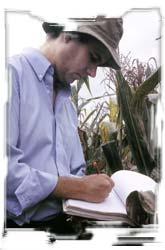 Now that all of CIMMYT’s new program directors have been officially installed, it is time to get acquainted with them, as well as their ideas and plans for the programs. This month we feature Kevin Pixley, director of the Tropical Ecosystems Program.
Now that all of CIMMYT’s new program directors have been officially installed, it is time to get acquainted with them, as well as their ideas and plans for the programs. This month we feature Kevin Pixley, director of the Tropical Ecosystems Program.
After growing up in Latin America and working in Africa for over a decade, Kevin Pixley is eager to extend the benefits of CIMMYT’s work in Asia, following the legacy of Nobel Peace Laureate and former CIMMYT wheat breeder, Norman E. Borlaug. “I read about Dr. Borlaug while attending high school in Mexico City,” says Pixley. “Wanting to learn more, I convinced one of my teachers to take our class on a field trip to CIMMYT’s headquarters in Mexico. Little did I know then how familiar this place would become to me, or that I would be seeing Dr. Borlaug fairly often.”
The Tropical Ecosystems Program he heads will focus on developing hardy, productive maize varieties for resource-poor farmers in lowland and highland tropical environments. “Across tropical Latin America, Southeast Asia, and Southern China, agriculture suffers from problems like drought, diseases and insects, and infertile and acidic soils,” says Pixley. “The demand for maize is increasing, but the profitability of maize farming—especially for small-scale producers—is declining. Improving the livelihoods and food security of those farmers is one of our key goals.” More nutritious maize will be another output of the program, including varieties with high-lysine and pro-vitamins A. “On the latter, we’re working with HarvestPlus, the CGIAR’s global alliance to breed and disseminate crops for better nutrition,” he says.
For the farmers in Latin America, where nearly 27 million hectares of maize are grown, the Program is developing and testing varieties that tolerate highly acidic soils, which cover large tracts in South America, and is also trying to reach the many small-scale farmers in remote, highland areas who have missed out on the Green Revolution. “Despite progress in Latin America, millions are still trapped in pockets of rural poverty with no access to markets or viable alternative livelihoods,” says Pixley. “We know that farming is central to their lives and that our work can make a difference.”
A citizen of the US, Pixley completed his BSc at Purdue University and his PhD at Iowa State, and in 1990 joined CIMMYT as a post doctorate in maize breeding—his Spanish language skills coming in handy. After three years he moved with his family to CIMMYT’s office in Zimbabwe to work as a maize breeder, and later became coordinator of the center’s regional program. During his tenure from 1993-2004, the southern Africa group and its partners worked extensively with farmers to test drought tolerant maize and make quality seed available. This year, enough seed was produced to sow more than a million hectares of drought tolerant maize. “Many things inspired me in southern Africa,” Pixley says, “but the commitment of local scientists, who work for very little money and under tough conditions, still strikes me as extraordinary.”
 Innovations
Innovations